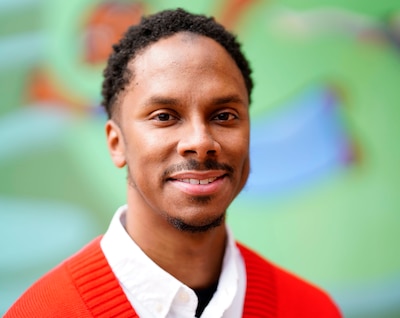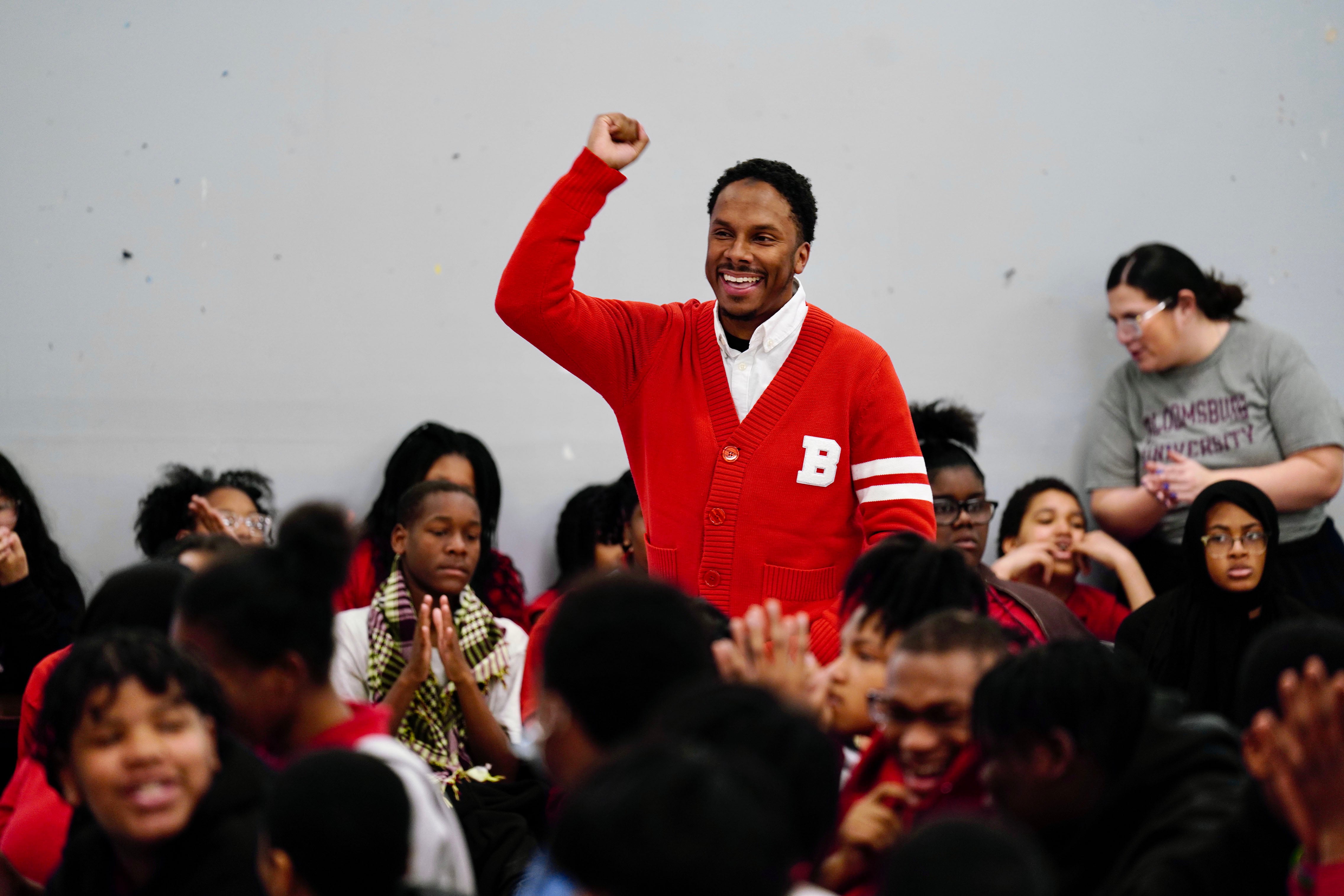For Bahir Hayes, a homegrown Philadelphia principal at William C. Bryant School, names mean everything.
Hayes can recall the name of the teacher he assisted years ago as a student teacher at Robert Lamberton Elementary School (Ms. Dougherty). He remembers his first assistant principal back when he worked for the Mastery Charter school network (Ms. Murphy), the names of the kids in his first class, and the names of every district official who has lifted him up or inspired him to stay in the profession over the past 13 years.
“I believe in acknowledging people that help you along the way,” Hayes said.
But there’s one person whose name is still a mystery to Hayes.
When he was in college at Bloomsburg University, Hayes was struggling academically and was told he may have to return to his family home in Philly during the spring semester of his senior year.
“In my head, I’m like, I can’t go back home for eight months. People were dying around me, people were being shot, killed, arrested,” Hayes said. “Me being home in Philly for that long was almost like a death sentence. I didn’t know what to do.”
A young woman saw how emotional Hayes was and made a phone call to a school official. Soon after, the dean of the college called Hayes and said he was allowed to return for the spring semester.
Hayes said he never found out that young woman’s name, but he’s never forgotten what it feels like to have someone go out of their way to advocate for you.
Now, he wants to do the same for his students and staff at Bryant, an elementary school and community that’s experienced decades of significant trauma. One leadership strategy he’s poured his energy into is known as Positive Behavior Interventions and Supports. This method focuses on reinforcing good student behavior through rewards like a trip to the school store or time spent in the school’s video game lounge.
Hayes is one of seven winners of the 2024 Lindback Award for Principal Leadership this year. He spoke with Chalkbeat about his journey into education and what he hopes to impart to any young people looking to achieve success in Philadelphia.
This interview has been lightly edited for length and clarity.

What inspired you to get into teaching and school leadership?
When I was in 12th grade, two of my little cousins’ fathers were murdered. I had built a very strong relationship with them. I’d pick them up from day care and drop them off. At this point, I was just in high school, so it didn’t really register to me that I was having such an impact on my cousins’ lives who didn’t have a male figure formally. Then, when I worked at a summer camp and became a lifeguard, I realized that my heart was in service to students. I felt like I could be the cool guy that was a teacher.
What was your first year like at Bryant?
Bryant is the school where a child was abducted in 2013. We’re up the street from where the MOVE bombing happened [back in 1985]. I just spent a lot of time getting to know the community, and it was great. The best first year you can have, until March 13 2020, when the world stopped.
That was my reality. A first-year principal, congratulations, you will be distributing Chromebooks and preparing to do something no educational system has ever done, immediately and abruptly. My job had gone from being the principal in the building to really like the mayor of the community — dropping off Chromebooks, visiting people’s homes, educating them on how to stay safe. No one knew what to do. We were just all learning together.
We made it through that hard time. Last year, the 2022-23 school year, we started to see that we were coming out of that dark space of the civil uprising, of the pandemic, and we started to see things change and get a little bit more normal. I feel like this year was the year where all of that paid off.
What did you learn during that time?
Public education is only as good as the people running it. It’s not about this magic charter or this magic neighborhood school. Of course, there are inequities everywhere. We have to think about things that we can control.
My assistant superintendent, Sean Conley, constantly speaks about providing access. And that’s how you create equity. I feel like people like Sean are what make schools great. It’s not this machine or organization, and it’s not giving people $50,000 bonuses, though I think teachers deserve a lot of money. I think teachers should be the highest-paid workers in the world because they are affecting our community.
You faced some job rejection throughout your career on your way to becoming a principal. What made you persist?
First and foremost, the people that made me persist are the students. I’m born and raised in Philadelphia. I’m a product of the School District of Philadelphia. I went to district schools from K-12. The reason why I got into this was those kids that needed someone that they can believe in and that believed in them. Ultimately, that was the hunger to make an impact.
The “nos” actually motivated me even more because it made me realize that I’m getting a no for a reason. I have to be prepared to know that it’s going to be hard and that nothing that you want comes easy; you have to really work for it. It made me refine my skills even more.
I’m so thankful that the district saw me as a person that had value. There was value in who I was as a reflection of the community that we are serving. I want to show that our kids can be great and show the world that young, Black kids can read, they can do math, they are articulate, and they can go to college.
That’s why this [Lindback] award means so much. It’s showing that everything that I went through matters, and that you’ve got to keep going. That if you are someone like me, that’s from the inner city, that looks like me and doesn’t fit the typical role, you’ve just got to work hard and be strong in your conviction of who you are. Believe in yourself, find people that believe in you and are aligned with your vision, and keep going. Don’t stop fighting no matter what.
What will you do with the Lindback Awards $20,000 prize money?
I really would like to invest in more [Positive Behavioral Intervention and Support] initiatives for the students. We saw that they had a great impact for our entire school community. We had zero suspensions this year. That’s massive for a neighborhood school.
Just thinking, how do we invest in more trips with our students? Is there a basketball court that we could put out there to allow our kids to play? I think that’s very important. And finding a way to celebrate with the staff.
And then just rest and relax. Shoutout to my boys in the group chat about Philly sports. We share our views really openly and we speak about what really matters. I feel like without that group chat, I don’t know if I could’ve really kept going. I always told them that when I get rich, I’m gonna get us floor seats.
Carly Sitrin is the bureau chief for Chalkbeat Philadelphia. Contact Carly at csitrin@chalkbeat.org.






